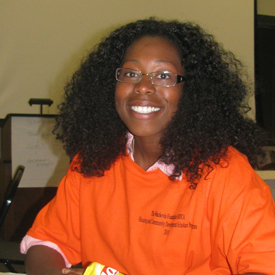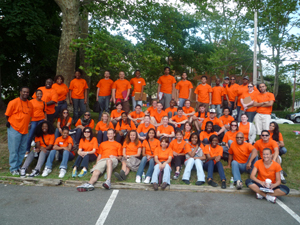Students spend their summer with agencies working to create affordable housing

Kimone Smith, a rising Rutgers–Camden senior, had a packed summer schedule. She was holding down a part-time job at the campus police station and an internship at PNC Bank under the vice president of Community Development.
But when she saw a flier for the Housing and Development Scholars Program, she had to apply. Smith’s career goal is to become the mayor of Camden, the city where she now lives, and she knew she needed on-the-ground experience to better understand the needs of the community.
After a competitive application process, she grabbed one of 44 open spots, and is working with Parkside Business and Community Partnership, Inc. to assess vacant and abandoned homes in Camden.
“It’s helping me understand everything about infrastructure,” says Smith, 21, one of 23 Rutgers students participating in this summer’s program. “While I’m looking at houses and assessing them, I’m talking to people, and they’re telling me about the houses and the street, and when it was better, and what’s happening now. I get a sense of what the urgencies are.”
The scholars program – sponsored by the New Jersey Department of Community Affairs (DCA) and Wachovia Bank – assists nonprofit corporations involved in affordable housing and community development. Each year, New Jersey students are selected for 10-week summer internships in design, construction, and community development. The New Jersey Institute of Technology (NJIT) administers the program for the state’s colleges and universities.
“The program offers an opportunity for the students to build their skills, particularly for those who . . . are interested in public sector careers,” says Rosalind Newton, director of career development service at NJIT and head of the program, which started in 1989. “It’s an opportunity for them to hone their skills in a multi-disciplinary approach.”

They also get paid: Undergraduate students earn $13 per hour, while graduate students earn $15 per hour.
To be considered, students must be majoring in architecture, civil engineering, environmental engineering, management, public administration, geographic information science, and urban planning/urban studies. They also must live in the state and attend one of New Jersey’s universities. Scholars are chosen based on GPA, an essay, and in-person interviews with participating agencies.
The internship program has two parts: All 44 students spent one week with the Jewish Renaissance Foundation to create a revitalization plan for the Greater Dublin area of Perth Amboy. They interviewed city leaders and residents, and, with the help of community development professionals, created a plan and presentation about what they believe would help that area of the city. The scholars received guidance during the week from a team that included staff from the Professional Development Institute at the Edward J. Bloustein School of Planning and Public Policy.
Then they head off to their individual internships with agencies across the state, including the Housing and Community Development Network of NJ, the New Jersey Department of Public Affairs, the Urban League of Hudson County, and Bright Minds Institute for Autism of New Jersey, among others. (The nonprofit agencies contribute 30 percent of the student wages.)
Oscar Villarreal, 27, a graduate student at the Bloustein School is interning with the Jewish Renaissance Foundation. Villarreal is teaming up with residents on a federally funded neighborhood revitalization program that provides funding to rehabilitate abandoned or vacant homes so they can be put back on the market. He’s also working to secure more money for the project so the foundation can rehab and resell more blighted homes.
“There’s a lot of stuff that you can’t learn in school,” says Villarreal, who also earned his undergraduate degree from Rutgers. “You may learn policy and theory and planning, but applying that to the real world issues like finding money and reaching out to community members – those are only things you can learn about in internships.”
Villarreal isn’t sure where he plans on working within the community planning world, so he is also using the internship as an opportunity to network. His supervisor sends him to development workshops and panels, not only so Villarreal can take back information to the foundation but also so that he can make connections that could help him launch his career when he graduates in spring 2011.
Smith, who was born in Jamaica, knows she’ll be going to law school after graduation to help her fulfill her dream of becoming Camden’s mayor. But the internship, she added, has also brought her closer to her goal by exposing her to the city on a grass roots level.
That’s valuable experience – even if she has to rush from her part time job to her PNC internship to Parkside and back again.
“If this is something you want to do, the internship gives you actual responsibility,” she says. “It helps you understand what it takes to redevelop a city.”